 42Likes 42Likes
 |
|

11 Oct 2015
|
|
Registered Users
Veteran HUBBer
|
|
Join Date: Nov 2013
Posts: 679
|
|
|
Long Way for a Wave
I love the way you went for a 49cc moped after the 650. This is a proper epic ride report!
Last edited by ridetheworld; 11 Oct 2015 at 03:24.
|

11 Oct 2015
|
|
Registered Users
HUBB regular
|
|
Join Date: Jan 2009
Posts: 58
|
|
|
"We’ve since learned that such a license to serve foreigners used to be needed, but no longer - the requirement was revoked in 2003. However, some local police still tell guesthouses that they need this license, which doesn’t exist. It’s all down to the whim of the local police and we’ve also learned some local jurisdictions have outlawed foreigners from being in their cities altogether."
Who ever told you that is wrong.It is a legal requirement enforced in certain parts of China.Same as when you are given foreign expert work visa and your employer has to take you down to the local police station and "introduce" you to the local police powers that be in certain parts of China. They are partly right that it can be up to the local police whether they are going to enforce it.Small towns will be more of a problem than bigger cities .
You stand out like dogs balls as two foreigners who have just bought a shiny new motorcycle travelling through China to me.
China what one person/ Govt dept says one day/week can change very quickly goes through out China.
Enjoy China.
Last edited by bigdamo; 12 Oct 2015 at 07:01.
|

13 Oct 2015
|
 |
Registered Users
Veteran HUBBer
|
|
Join Date: Nov 2010
Location: Santa Cruz, California
Posts: 316
|
|
Well, we certainly stand out - most of the town seems to know we're there withing a few hours. But the bike is no longer shiny 
Our understanding is that hotels must register us with the local police in all cases, but that there is no longer a special license required for them to be able to host foreigners. This expat teacher of 10 years is fluent in Chinese seems to have gone through quite a lot of trouble to get to the bottom of this non-existent license:
https://www.lostlaowai.com/blog/chin...tion-tutorial/
According to her research, the license was revoked by the Two Parties Congress of 2003, and now, most hotels have the nationwide standardized system for registering hotel guests. Indeed, we have seen the exact screenshots of the registration system for foreigners from her blog post behind the counter of the many hotels that turn us away. All that said, I'm sure the local police have the final say anyway, so who the hell knows.
|

13 Oct 2015
|
|
Registered Users
HUBB regular
|
|
Join Date: Jan 2009
Posts: 58
|
|
|
"nationwide standardized system" in China yeah right.
I wouldn't be to worried about being not allowed to stay at certain hotels it's going to happen if your going the back roads route.
I would be more concerned about riding across China with no Chinese C1E license no insurance and the bike probably registered in someone else's name.
Have an accident be it your fault or not and human ATM comes to mind.
Enjoy China
|

18 Oct 2015
|
 |
Registered Users
Veteran HUBBer
|
|
Join Date: Nov 2010
Location: Santa Cruz, California
Posts: 316
|
|
actually, its not registered at all 
|

18 Oct 2015
|
 |
Registered Users
Veteran HUBBer
|
|
Join Date: Nov 2010
Location: Santa Cruz, California
Posts: 316
|
|
|
Kung Fu Riding in the Middle Kingdom

Between daily servings of diesel dust we’ve found some places in China worth the work to get there. But with the regular visits of the local police to our door, truck backups, and an endless supply of cities, it isn’t exactly the overland adventurer’s dream destination.

We couldn’t leave Beijing without a visit to the Forbidden City, home to emperors and the political center of China for centuries. It seemed like about half of China had the same idea, and we spent the day in the midst of thongs of Chinese tourists. During the city’s heyday, only the servants and councilors of the emperor were allowed in the city and some of the emperors spent their entire lives within the city walls. It was a cool place, but hard to appreciate from within the crowd. As soon as we procured our Vietnam visa we motored out of Beijing, heading southwest.
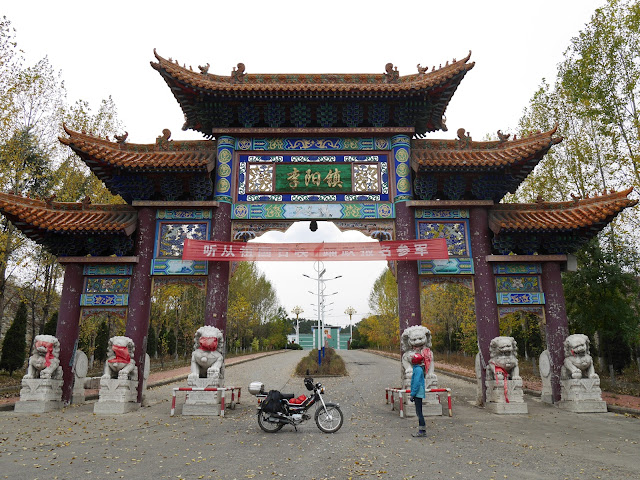
Despite the challenges, China is a very moto-friendly place. The road usually has a massive shoulder and in the cities there’s nearly always an entirely separate lane with a curbed divider for bicycles and scooters. In the cities, you’ve got grandmas, 10 year old girls, and couples with a little kid hanging off the back or a baby chilling in the front basket; all zipping around on little scooters. Most people are on their phones and don’t seem to be paying much attention and hardly anyone wears a helmet, but they ride pretty slowly. Drivers are very used to having motorbikes and scooters around, so they’re pretty good about watching out for them. With so many fewer cars, it hugely alleviates traffic and parking problems in big cities like Beijing. China is light years ahead of the U.S. on this front, where it seems to be the default position that everyone should be driving around in a massive truck, but we make a few concessions for fanatics and daredevils that want to get where they’re going on two wheels.
Now without our tent and the weather still a bit cold at night to sleep out in the open, we’re constantly searching for a place to stay. Accommodation is great value when you can find it, with comfortable rooms usually available for less than $20 USD. The problem is finding one that will take us since most places don’t seem to serve foreigners. One night we spent 5 hours looking, tried a dozen hotels, and were turned away by all of them. We gave up and started looking for a building site instead, figuring that we could just sleep the night in some unfinished concrete structure. Every place we tried, we were met with a barking dog from the darkness that convinced us to turn around. We were exhausted and on our way to just pass out in the bushes, when we finally ran into a place that let us stay.
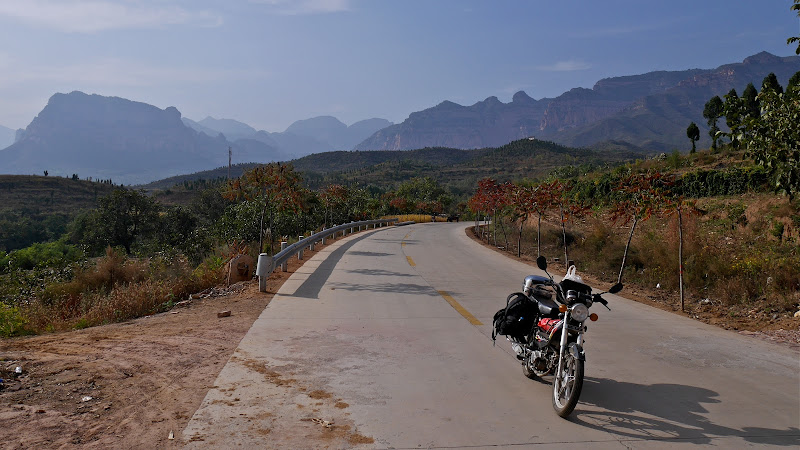
With Jamie’s tutelage I finally learned to say a few things in Mandarin, but it honestly gets me into more trouble than it’s worth. Saying my one thing I know how to say usually prompts the other person to start rattling off in Mandarin. It gets really funny when they start writing things down in Chinese characters to help me understand. I look down at random arrangements of elongate apostrophes grouped together in cubes, and they look up at me expectantly. I mostly sit there nodding with my eyebrows raised and smiling stupidly; the most confused white man in China.

The level of development in China is like nothing I’ve ever seen in the world. Every town we pass is a big town and most of them have a whole bunch of 20-30 story buildings going up. The road infrastructure is way overbuilt with far more lanes than are needed for the cars currently on the road. It’s just unbelievable. They’ve really planned a lot of the cities out well. The country highways, however, are a different story. We spend days at a time in a sea of trucks, all of them the same open-bed style, carrying I have no idea what. There are literally thousands of them. Without the trucks there would be hardly any traffic on the rural roads. The only thing that I can think is that they are carrying either coal or road-building materials. We arrive everywhere with our faces covered in diesel dust, looking something like Alice Cooper during his glory days.
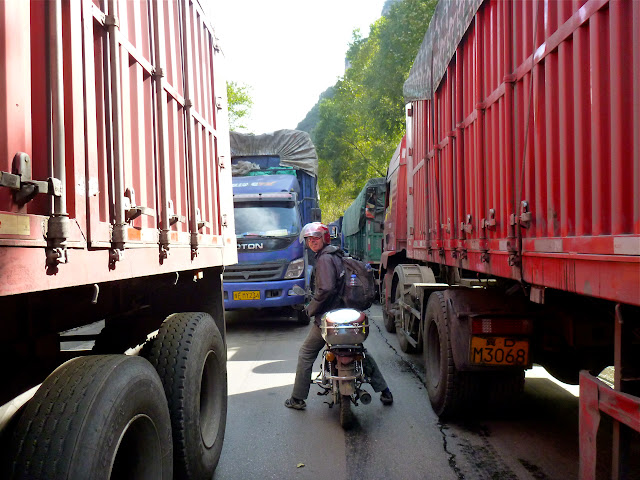
I don’t think that there are any right of way rules, or if there are, no one knows them or follows them. Every intersection is a slow game of chicken. The only way anyone ever makes a left turn is to mow through the oncoming traffic until they can kind of merge into the opposite lane. No one ever stops before entering a highway. If there isn’t a vehicle directly in front of them, the standard procedure is to just launch up onto the road regardless of what’s coming. A blind corner in the middle of a traffic lane however is a perfectly acceptable place to stop for a chat. We see near misses constantly. When there is a collision, both drivers get out and start yelling at each other. With no rules for who gives way, I’ve no idea how you might determine who is at fault. I suppose that’s why they both yell. On the Suzuki, we could use our speed to squirt us out of potentially dangerous situations, but now our only defense is slowness. As long as we move slow enough we can usually rely on the fact that someone won’t intentionally run us down. Usually.

We’ve had some hard days on the road riding this little bike slogging through one city after another or navigating the truck-scape. Most days we do nothing other than ride all day long. Progress is slow, and some days I’ve just ended up cursing China altogether at the top of my lungs as we putted along. One day we didn’t even make 100 kilometers as we got stuck in the middle of one huge truck jam after another. The first one went for at least 5 kilometers and the trucks were wedged so tightly together that the only way we could get through was to take both of our packs off the sides and wear them while we threaded through them. It was super not fun. We ran into another truck jam that went on for 12 kilometers. Some of the cities won’t let the truck pass through during the day, so they’re just lined up waiting for the entire day. There are moments that China has drained my adventure spirit altogether. Jamie takes it all in stride better than I do and keeps us on track.
After five days of riding, we arrived at the Shaolin Monastery, birthplace of the martial art of Kung Fu. The temple grounds were shrouded in the mountain mist and the air was a still as a Kung Fu master's mind. Since I still carry my 12 year-old-self around with me, I thought this would be the coolest thing ever, because Kung Fu is rad. According to Chinese legend, it originated during the semi-mythical Xia dynasty, some 4,000 years ago. The Shaolin style of Kung Fu is regarded as one of the first institutionalized Chinese martial arts. I’ve since learned that in Chinese, the term Kung Fu doesn’t refer to the martial art exclusively, but to any skill that is acquired through learning and practice. So you can do some Kung Fu cooking or be a Kung Fu programmer.

The young students of the local Kung Fu schools punched, kicked, and flipped at one another demonstrating their mastery of the art. Everybody was Kung Fu fighting. Those cats were fast as lightning. Our display was slightly less impressive.

On the way down from visiting the Shaolin Temple, the mist turned to rainfall and showed no signs of stopping. Our $5 rain gear was beginning to disintegrate. I had a massive hole ripped in the crotch of my rain pants that I didn’t know about until I started feeling like I’d wet my pants. There’s also a big rip up the side of one of the legs from kick starting the bike that I tuck into my sock to keep it from flapping in the breeze. We’re both wearing our Keen sandals, since they’re now the only shoes we have, so our feet get soaked right away, but at least our socks are wool. Wearing two pairs of wool socks is now my version of motorcycle footwear. We’ve been traveling non-stop and have only one pair of pants each, so our clothes are constantly filthy. In our tattered rain gear, inappropriate footwear, and heavy metal diesel face paint, we’ve got a distinct zombie apocalypse look. I don’t think our bike can outrun a zombie though. Sometimes I have to push it.

The clutch on the bike had started sticking and it picked the moment we were entering a city, on a bridge to get stuck completely. The arm attached to the engine case was jammed so that it wouldn’t engage the engine at all. Here we were on a bridge in the midst of city traffic and getting soaked and I can’t even get the bike moving. It’s moments like this that I wonder why in the hell we’re doing this at all. The only way I could manage it was to use my right foot to kick the clutch arm free while giving some throttle at the same time. The first couple tries I just did a quick wheelie as the clutch popped free and then killed the engine, but I got the hang of it. Once we got off the bridge and moving I just matched the revs to the gearbox and shifted without the clutch, but every time we came to a stop and had to pull the clutch in and it would stick again. After a bit of Kung Fu riding we made it into town and found a guy tinkering in little scooter garage to unstick the clutch lever.

It was slow going as we headed for the pits of the Terracotta Warriors. We rode for a couple more days towards the city of Xi’an and we froze when we gained a thousand meters of altitude. We just don’t have the gear to ride in the cold anymore, and once again we've found ourselves trying to outrun the winds of winter. When the rain started in again, we were just too cold and had to hole up for the night after only making 80 km’s for the day.The terracotta warriors are these exquisite figures were made to protect the first emperor of China, Ying Zheng, in the afterlife. More than two thousand of them have been exhumed since a farmer digging his well discovered them in 1974, and they’re still digging more out.

They stand in row upon row within the very pits that they were buried. There are archers, infantryman, charioteers, and officers; each of their faces distinct from one another. It’s sort of an eerie sight; all of them lined up like that, seemingly assembled for their duty in the afterlife.

Every time I look at the map I grossly overestimate how far we can ride in a day. It’s difficult to wrap my head around how slowly we’re moving, and when we get lost, have some mechanical trouble, or can’t find the way across a river it just feels like we’re not getting anywhere at all. One morning I came out to find a deflated rear tire squashed beneath our beastly machine. We just pushed the bike around the corner to the local scooter shop to put in a new tube and change the oil while we were there. A scooter shop never seems to be more than a block away and the value is fantastic. A new tube along with a liter of oil and the mechanics work came to a total of 60 Yuan, which is about $9.50 USD. There are faster and easier ways to get across China, but I can’t imagine a cheaper one.

In the North, practically all we ever see being farmed are small cornfields. It’s fall here, so the corn has been picked and husked (by hand about everywhere we’ve seen) and now every surface available is occupied by corn drying in the sun – driveways, public squares, highway lane dividers and even entire traffic lanes have all been taken over by the local farmers.
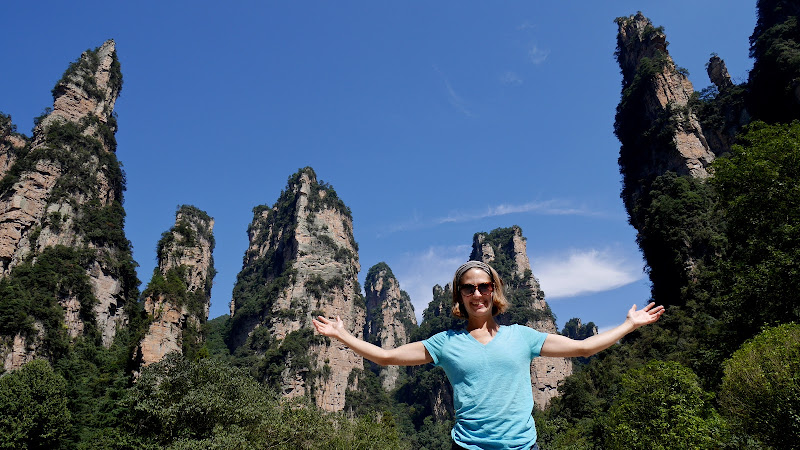
We’ve spent so much time riding through really uninteresting landscape in China it was great to finally find somewhere that made us excited to walk up a hill. Zhangjiajie National Park is filled with sandstone and quartzite spires all standing at attention amidst the gaping abyss. The scene is truly otherworldly and reminiscent of the the digital worlds created for Hollywood movies like Avatar or Maleficent. The place feels prehistoric, as though a pterodactyl gliding amongst the pillars wouldn’t seem out of place. We walked along a stream valley, slowly ascending into this freak of geology.

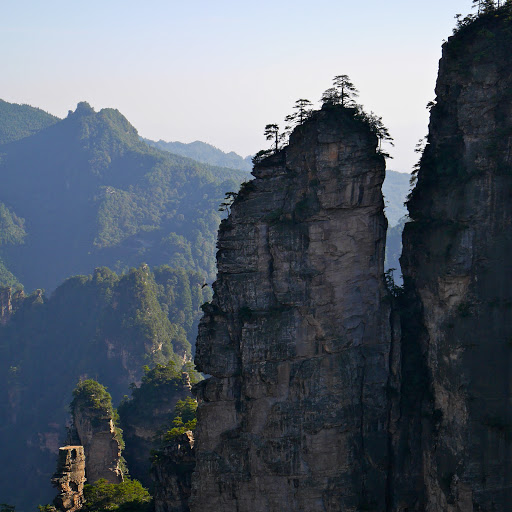
Tiny enclaves of vegetation perched at the top of the pillars and spilled down the vertical pink and white rock to the jungle below. I can't imagine a landscape better suited to a set of wings.

In Chinese, the word for America means the Beautiful Land, and China is known as the Middle Kingdom. China certainly feels like the center of the world with all of the people here and there are some beautiful places to be found between the city slogging and truck dodging. Foreigners are a rare sight most of the places we've been riding, but people have been very kind to us the whole way along. Our little bike has pushed us to about the middle of the Middle Kingdom, and we’re just hoping it can keep pushing us to the southern edge of it. It’s a lot to ask of a meager 48cc’s of displacement, but at least it’s faster than pedaling. Barely.

|

19 Oct 2015
|
|
Registered Users
HUBB regular
|
|
Join Date: Jan 2009
Posts: 58
|
|
Quote:
Originally Posted by garnaro

actually, its not registered at all  |
" When there is a collision, both drivers get out and start yelling at each other. With no rules for who gives way, I’ve no idea how you might determine who is at fault. I suppose that’s why they both yell."
I've seen them do more than yell at each other after an accident. It's easy for them and the police to determine if they have an accident with you who's at fault.
|

30 Oct 2015
|
 |
Registered Users
Veteran HUBBer
|
|
Join Date: Nov 2010
Location: Santa Cruz, California
Posts: 316
|
|
|
Manufacturiing Stoke in the South China Sea

We rode south towards the Nan Mountains and as the temperature rose, the cornfields that had been a constant element of the scenery slowly transformed to rice, cotton, and sugarcane. 
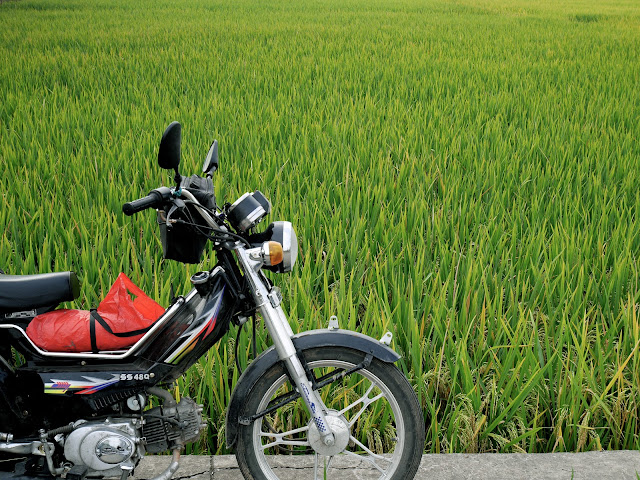
We shot by storefronts piled high with cotton drying in the sun.

The good new is that the bike is still running. The headset keeps coming loose, the fork travel is notchy, I constantly need to adjust the clutch, the headlight burnt out, and the rear springs produce a horrendous racket. I asked half a dozen places for a new oil filter before I learned that there is no oil filter. She’s a delicate little machine and anything plastic breaks off with the slightest bit of force. The drum brakes feel like I’d do better just putting my feet down to stop us and I have to get the revs just right to convince her to change gears. But even with all of her faults, she’s been plugging along for thousands of kilometers now, which is honestly more than we’d hoped.

The other good news is that we finally left behind the never-ending lines of trucks and cities packed so close together that the outskirts of one always seemed to touch the outskirts of the other. Open country lanes wound out in front of us, with ornate little bridges leading to villages, and pointy pagodas flanking the road. Even on this bike, it was fun railing through turn after turn on a road that snaked up a river gorge.

The perfect tarmac that we’d become accustomed to disappeared and was replaced by old concrete roads with ditches and ridges across the entire lane. Every one that we hit too fast jarred us to the bone and made me wonder how big a hit the bike could take without bending a rim or cracking the frame. Eventually the concrete and tarmac went away all together and we were left with a rutted, muddy, gravel road. We moved at an absolute crawl trying to avoid the biggest of the holes and wincing at the ones we couldn’t.

Crossing one rickety suspension bridge was a hair-raising affair. I could hear each board slap against the steel below as though it was trying to find a way to slip down into the underlying abyss and I could feel the whole thing swaying beneath me in the wind. I was fully puckered when I saw sections ahead with boards missing and just hoped there wasn’t a big enough hole to swallow my front tire.

We went out for a distinctly Chinese dining experience called ‘hot pot’, where you cook your own food in a little pot with a stove inset to your table. First of all, in China when anyone asks you if you want something ‘la’ (spicy), don’t say a little bit. The correct answer is no. A little bit makes you feel like you need to run around outside in the cool night air with your mouth open. Within the first few bites my tongue was numb. I had trouble regulating my little table stove, so that my pot was constantly roiling vigorously and I was talking to Jamie from behind a cloud of steam. I didn’t do a very good job cooking, but by the end of the meal my pores felt remarkably clear.

Lots of things in China are funny to western eyes. Sometimes they make us cry, but mostly they make us laugh. Here are a few:
Celebrity status. There just aren’t very many foreigners around in China, so we catch people staring at us all the time. Sometimes, out of the corner of my eye, I catch someone taking a photo with their phone. I like to imagine they think we’re famous people.
Lugis. Spitting seems to be the most popular way of sharing with your fellow citizen. People spit everywhere – into the public sink, at the restaurant table, next to your feet – it makes no matter, there is a universal aversion to swallowing your own saliva.
Smokytime China is a seriously smokey place. Nowhere is safe. People light up in the elevator next to you.
Duck herders. I did a double take the first time I saw an old guy walking on the road with a long stick behind a massive flock of ducks. It kinda made me happy.
Big Brother. When the police aren’t keeping tabs on us I’d swear that there is someone on the other end of the internet tube looking in. Access is chronically slow everywhere and I always imagine a little Chinese man in a little room manning an enormous internet switchboard examining every page I’m trying to load and deciding whether it's fit for viewing.
Vegetarian stuff always has meat in it. There is no direct way to say to someone in Mandarin that we eat vegetarian. Jamie always tells people that we don’t eat meat, but the word for meat in Mandarin means pork. So that essentially communicates that we’re cool with cow, chicken, lamb, snake, dog, whatever. The next approach is to say ‘we eat vegetables’ and point to a menu picture of a dish with loads of vegetables and no meat in sight, but that often just gets a plate of meaty vegetables. And sometimes, inexplicably, results in a steaming bowl of meat.
Chinglish. Funny translations of English phrases are constant entertainment. Yesterday I bought a bag of “numb and spicy” flavored chips and Jamie got some peanuts that were “smelling in cream”. In one hotel shower there was a small sign that read ‘Before falling, please step carefully”, and the information sheet informed us that we would be “charged 60 Yuan for each additional bumhole”. I didn’t even know it was that kind of hotel.
We rode into one city with the coolest two-wheeled transit system ever. Below the elevated roads for the cars was a network of narrow lanes for the scooters. It was amazingly liberating, zipping around the city without having to contend with truck and bus drivers. We flowed along the lanes like a fish in our school, unable to determine who was leading the way, being driven as much as driving ourselves.
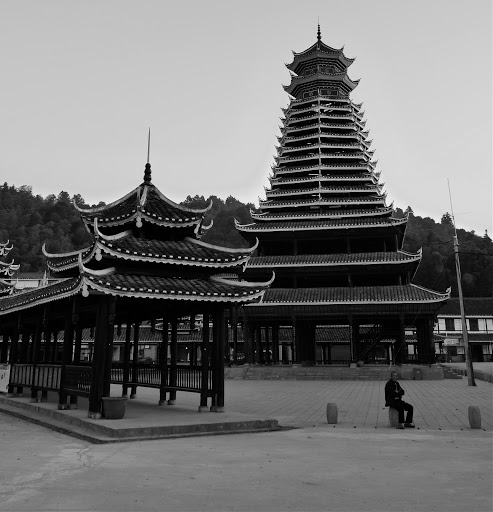
When we arrived at a hotel, the receptionist immediately called the police without any explanation and told us to stay put. Apparently we’d landed in a town with a military base that was restricted to foreigners. Oopsie. The plice agent arrived and told us that we couldn’t stay in the town. Not this again! It was already dark and fortunately rear tire on the bike had just gone flat, so we weren’t going anywhere. I showed him the tire and after a half hour of questioning via Google Translate he seemed satisfied that we weren’t spies. We were allowed to stay in the town but he made it very clear that under no condition were we to leave the hotel. We had packet noodles to eat and so were perfectly happy under house arrest.
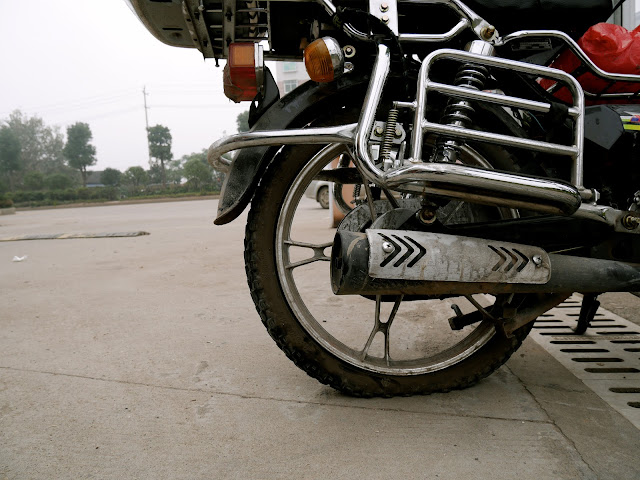
Our experience has been that almost no one China speaks even a little tiny bit of English. It seems odd since it seems to be studied in schools universally and there are signs in English all over the place. You can go to the most flash looking hotel with the word ‘International’ in the title, but it doesn’t matter – not a word. This is pretty understandable, really, with two billion people speaking Chinese, and very few foreigners about, why would anyone speak English. We’re completely dependent on Jamie’s basic Chinese skills to find somewhere to eat and sleep. My vocabulary now includes four words that I use up pretty quickly upon entering a restaurant. Without preface, I generally walk in and say “hello….  …cold.” Seems pretty rude sounding, really. If I learn the word for ‘now’, then I can make my staple phrase unmistakably rude, “hello…  …cold….….now.”
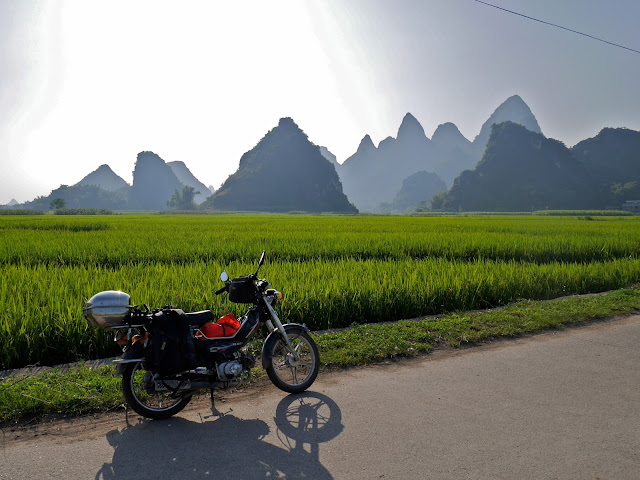
We rode for days through the Nan Mountains of southern China enjoying the scenery immensely. The landscape was dotted with these pointy little hills everywhere. Our road had us bouncing from one hill to another amongst the rice fields as we made our way south.

We finally reached the edge of the mainland and took a ferry across the across the Qiongzhou channel in search of a wave to ride on a big Island. I knew that there was swell in the water, so as the sun sank we raced to get to the beach (racing for us is 50 km/hr (31 mph.) We reached the south coast of the island a couple hours before dark and found the local surf club, which had loads of boards available to use. The last place I’d been surfing was two continents away on the west coast of Norway, so when I saw a ruler edged left hander reeling along the reef I was frothing to get in the water.

I traded waves into the darkness with just one other surfer – a guy from Cuba who was in China on a business trip. I had imagined riding this wave while slogging through countless Chinese cites and now I was trimming along one after another in the fading light. It had been too long out the water and I was stoked to be sliding waves again.

This wave really has no business being here at all. A cursory look at the map would tell you that the South China Sea is not the place to go looking for waves. Generally, we’re after an expansive body of water where a storm can get cooking over a large area, sending swell energy towards the coastline without the storm being right on top of the coastline. The biggest and most consistent swells happen in oceans, not moderately sized seas. Both the Mediterranean and the Caribbean outsize the South China Sea by a fair margin area-wise. Nonetheless, some magical combination of geography, atmospheric dynamics, and ocean conditions have created a wonder of a wave here. On the right swell, the reef churns out multiple pitching tube sections. My Cuban friend and I weren’t exactly hooting at each other in stand-up backside barrels, but it was still pretty fun.

The waves were biggest on the first night and slowly tapered off during the coming days. They ended up perfect size for Jamie to come out and surf and we had a super fun couple of days riding waves together. The swell finally just about died completely and I grabbed the paddle board to slide some micro waves and try to do something about one of the major hazards of adventure moto-scootering: the most ridiculous farmer tan you’ve ever seen. Three days before we arrived it had gotten too hot to wear my insulated jacket while riding, which quickly turned me into a two-toned moto-hobo.
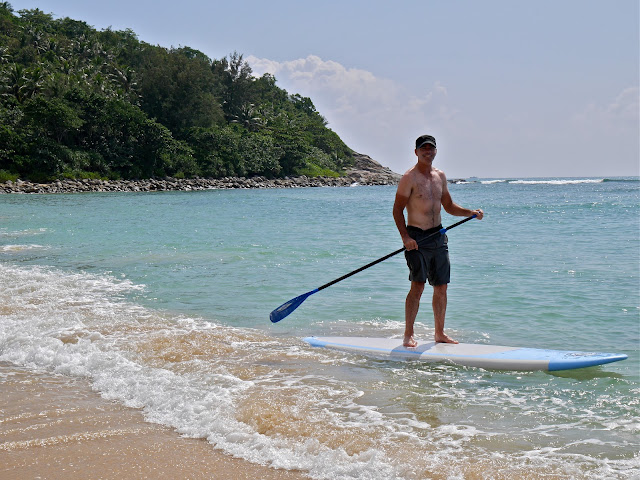
We’ve ridden more than six and a half thousand kilometers across China during the last 6 weeks with barely any time off of the bike. It felt like pure luxury to just not be headed somewhere new every morning. The beach was gorgeous and I couldn’t complain about the company.

After 5 days of surfing we made ready for the journey south into Vietnam. We had the choice to head for a border crossing via Dong Dang or Dong Hung. On the way to Dong Hung we’d pass through Wang Dong. I promise I’m not making these names up. It’s pretty much impossible to map out a route through Southern China without giggling like a 6th grader.

Riding along the north coast of Vietnam sounds like it would be absolutely epic, but the problem is that we have no idea whether we’ll have a bike to ride. Given the information available, we most likely that won’t be able to cross the border with the bike. Like China, Vietnam restricts the entry of foreign bikes. We’ve been unable to find any account of a traveler successfully making this crossing with a bike and several accounts of failed attempts. Our only hope is that the absurdity of such a journey on this little bike makes them laugh enough to give us a pass. Fingers crossed.
|

30 Oct 2015
|
|
Registered Users
HUBB regular
|
|
Join Date: Jan 2009
Posts: 58
|
|
|
Well done not many people can ride/drive across China it takes a certain mindset to achieve pig headed stubbornness is one of them.China is the fourth largest land area country in the world. 6 weeks emm 6 weeks doing Xinjiang is to short.You can catch a wave in Hangzhou at certain times if your real keen.
|

15 Nov 2015
|
 |
Registered Users
Veteran HUBBer
|
|
Join Date: Nov 2010
Location: Santa Cruz, California
Posts: 316
|
|
|
China certainly tested our resolve at times. It has been a fantastic place, but we were ready to be moving on....
|

15 Nov 2015
|
 |
Registered Users
Veteran HUBBer
|
|
Join Date: Nov 2010
Location: Santa Cruz, California
Posts: 316
|
|
|
Good Morning Vietnam

We were delayed heading south from China by rain that came down in sheets as we hopped from one covered spot to the next.  We were anxious to get to the border and find out whether or not we’d be able to continue the ride. By all accounts we’d found, we wouldn’t be able to bring the bike through the border due to Vietnam's restriction on foreign bikes.
The Beilun River forms the border between Vietnam and China at Mong Cai, with a border post situated on opposite banks. We rolled up to the Chinese side and were turned away immediately by the guard. I thought that we’d at least make it out of China! He told us in no uncertain terms that no motorbikes were allowed to cross that bridge, “It is not possible to ride motorbike.” We could go, but the bike had to stay. Someone came over to help translate, and we went back and forth for about 20 minutes with me trying every avenue of persuasion I could to at least help us identify an alternative. But it was to no avail. We rolled down from the gate in defeat. We could take heart in the fact that we’d already accomplished what we’d originally set out to do: we’d ridden across China under our own power, on our own schedule, without a guide shuttling us about. With nearly 7 thousand kilometers on the clock of our little machine, we’ve gotten our money’s worth and then some. The police didn’t nab us and a truck didn’t cream us, so I was calling it a win for team moto hobo.
Dogged persistence had paid off in the past, so I decided to give it one more try. I walked into the immigration hall as though leaving China and found a customs agent that could speak some English. I showed him the map of our journey, a picture of the bike, and told him where we were headed. I could tell he was stoked on it, and now on my side. He made a call, then went off to talk to someone and told me to stay put. After a half hour, another guy came over, asked a couple of questions, and then simply said, ‘OK’. OK? OK what? I can ride the bike across the bridge that no motorbike can cross? Awesome! But that wasn’t quite right. He shook his head and indicated that I should bring the bike up the stairs into the immigration hall . Really? Bring it in here? Whatever you say boss! I motored the bike up the stairs and then rolled it straight through the immigration counter where they stamped our passports as though it was a piece of wheeled luggage that just happened to have an engine attached to it. They even turned off the metal detector so that I could roll it through. And just like that, something that wasn’t possible an instant ago became so.

That was supposed to be the easy part, but now the task was to get into Vietnam on the other side of the bridge. If we couldn’t make it through, someone on that bridge was going to win a free scooter. I pushed the bike through the immigration counter as though I did it every day. Mind the oil drips folks! Everything seemed cool, but then we saw trouble in our path: stomach pouting heavily over the belt, thin mustache, overtly lounging posture, and relishing in the kowtowing of underlings. We had a class 5 proud-belly big-boss on our hands, and he looked darn grumpy. He halted our progression through the hall gave us a ‘slow down there partner’ sign, all without even interrupting the rocked-back attitude of his chair. I flashed my biggest silly tourist grin. We waited while his officers made some calls. We had no plate, no license, and no documents for our petrol burning luggage rack being wheeled through this hallway. I didn’t even have a sales receipt. I exhaled too soon, this isn’t going to work at all. After a tense 10 minutes of waiting, I’d yet again resigned us to failure, but to my disbelief, he gave us the go ahead. Thirty steps later were free of the hall then out the gate. I couldn’t believe it. I thought it would at least cost us a bit of cash. We get to ride the coast of Vietnam, Yahooo!

The first stop was to check out the geological marvels of Bai Tu Long and Ha Long Bay on the north coast of Vietnam. On the north coast of Vietnam, we rode through one fishing village after another, trying to get a view of the coastline that we’d heard so much about. We finally found our way out to a bustling little port at Bai Tu Long where fishermen hauled supplies from shore, jockeyed boats for a space at the dock, and women paddled from one colorful boat to another. I’ve never seen a coastline like it – the bay was dotted with thousands little domed islands with bright white limestone cliff faces. We’d hoped to find a boat to take us for a cruise around the islands, but it was pretty clear that we were in the wrong place unless we wanted to go fishing.

We motored on to Ha Long Bay and it felt as though we had landed on planet backpacker. The place was utterly overrun with hordes of twenty-somethings toting enormous packs on and off of tour boats. We’d been off of the tourist track for a long time and it was strange to land in the middle of a place where everyone speaking English, trying to get us to sign up for a tour, and come to the bar for jello shots. Backpacker madness aside, the majesty of that bay was undeniable. It was a truly fantastical scene as we motored our way through narrow channels between the islands and alongside their towering walls.
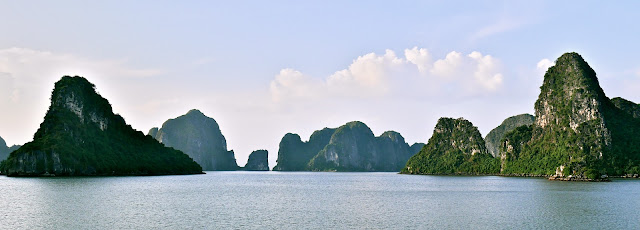
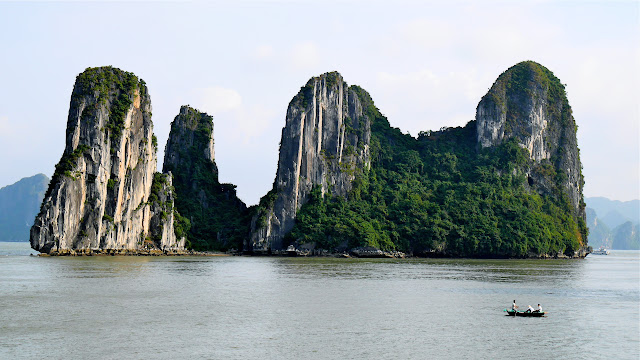
Riding south, we escaped the swell shadow of China’s Hainan Island, I was amped to get our first view of the coast exposed to swell. We saw a number of little beachbreaks that looked well worth having a surf, but I still had to find a board to ride. All I could do was stand there watching, wondering if anyone had ever surfed them.

Headed for Da Nang, we tried to wait out a storm in Dong Ha, but the next morning it just kept up, so we had nothing to do but get riding and get wet. We rode pretty slowly and stopped at little shops for Vietnamese coffees when the worst of the downpours came. We got caught in a real torrent coming over Lang Co pass towards Da Nang. The pass marks the divide between the former North and South Vietnam and below the road are situated disused French and American army bunkers.

It’s been strange to think of the fact that we’re here to tour around and have a good time, while the Americans here during our parents generation came to fight. My dad joined up when he was just 17 and was part of operation Starlight, one of the first major offensives, launched not far south of where we now rode. On the American side, the war was part of a larger containment policy, to stop the spread of communism, but to the North Vietnamese, it was a fight to expel foreign colonial forces, first the French and then the Americans. The human toll of the fighting was huge, felt much harder on the Vietnamese side, with casualties estimated in the millions. Soldiers like my dad didn’t get to decide whether or not the war was a good idea, they just had to go fight, and the people in the villages caught up in the middle of it all did what they could to survive.

We visited a town that spent the entire war underground. They had an elaborate system of tunnels dug into a hill and for years rarely came above ground during the day unless absolutely necessary. I was pretty happy to get out of those tunnels after 20 minutes, so I can’t imagine what was going on above ground to keep people down there for years.

We met a woman named Tam who had a small café and lots of stories about life during the war. Her café is plastered with images from that time. She was just 14 when she learned English and became an interpreter for the Americans. Her family had nothing to eat and working for the Americans made life a lot better. When Saigon fell in 1975, she and her family found themselves on the losing side - collaborators with the enemy. The North Vietnamese took everything from them, her brother was imprisoned for 7 years, and the rest of the family was soon forced out of Da Nang and into the nearby mountains to try to survive. Decades later, things are much better, Tam has her little café and her brother has lived in the U.S. for the last 30 years, but hard feelings still persist.

Communism won the war, but since then, Vietnam has adopted a largely open, free market economy. Lifting of the U.S. trade embargo in 1994 and the continued interest of international investors has driven Vietnam to be one of the fastest growing economies in the world. Da Nang is a bustling city filled with nice cafes, restaurants and hotels, and lots of foreigners that call it home. Everyone has a scooter to ride, and the city is a swarm with them. Young people weren’t alive during the war and seem to look mostly to the future and the opportunities now at hand.


We left the rain behind in the mountains on the way down to the beach in Da Nang. The sun was shining, we found some little waves breaking, and a surf shack owned by a Portuguese expat called Goncalo. Stoked. I spun donuts on the beach in celebration.

Jamie and I grabbed some boards from Goncalo and rode the beachbreak for a few days, hanging 5 on China Beach. Jamie is still new to surfing, so the waves were perfect size for her and surfing with her makes micro-waves fun for me too.

We hung around Da Nang for 5 days waiting for a swell to arrive that I’d hoped would bring a nearby point to life. Goncalo surfed it all the time and assured me that it was worth the wait. He nearly always surfs it alone and was happy to have some company in the water. To my great disappointment, the forecast swell never materialized and I had to be content with longboard cruising on the beachbreak. We’ve now run out of time to wait for swell, with our Vietnamese visa expiring in 2 days it was time to head for the Laos border.
Of course the morning we’re to leave, the bike wouldn’t start. Luckily it turned out to be just a bad spark plug. When I popped in a new one, she roared back to life - as much of a roar that a 48cc can muster anyway. We left Da Nang and ascended back into the mountains and crossed the Ho Chi Min Trail with impossibly fluffy clouds accumulating along the ridge tops. We were headed for Laos and feeling pretty content to still be moving forward on two wheels.
|

16 Nov 2015
|
|
Registered Users
HUBB regular
|
|
Join Date: Nov 2013
Location: Key West, Florida
Posts: 26
|
|
|
The madness continues. I have no idea how you have got away with what you have got away with but I am expecting great things now from you at every border crossing. And I am now more certain than ever that 50cc is too small for my elderly self. Nevertheless beggars can't be choosers and what you have done beggars belief.
|

17 Nov 2015
|
|
Registered Users
Veteran HUBBer
|
|
Join Date: Nov 2013
Posts: 679
|
|
|
Hey you guys are on a roll, obviously the cosmos is gunning for you right now. Lovely RR and you're gonna love Laos (no surfing there though, I'm pretty sure!), the scenery there looks like ha long bay but with an ocean of bright green paddy fields, instead of the blue of the ocean. Enjoy!!
|

18 Nov 2015
|
|
Registered Users
Veteran HUBBer
|
|
Join Date: Jan 2012
Location: Germany
Posts: 111
|
|
|
Awesome!!!
How cool is that? Riding through China not only without guide, but two-up on a 49cc moped and then even crossing into Vietnam with it.
Great photography, great story, sweet little China moto and you are a fortunate guy having such a wonderful woman sharing your adventure.
  
|

3 Dec 2015
|
|
Contributing Member
Veteran HUBBer
|
|
Join Date: Nov 2007
Location: Perth, Scotland
Posts: 202
|
|
Inspiring guys , not sure i'd have your patience, first class effort  
|
|
Currently Active Users Viewing This Thread: 1 (0 Registered Users and/or Members and 1 guests)
|
|
|
 Posting Rules
Posting Rules
|
You may not post new threads
You may not post replies
You may not post attachments
You may not edit your posts
HTML code is Off
|
|
|
|

Check the RAW segments; Grant, your HU host is on every month!
Episodes below to listen to while you, err, pretend to do something or other...

2020 Edition of Chris Scott's Adventure Motorcycling Handbook.
"Ultimate global guide for red-blooded bikers planning overseas exploration. Covers choice & preparation of best bike, shipping overseas, baggage design, riding techniques, travel health, visas, documentation, safety and useful addresses." Recommended. (Grant)

Led by special operations veterans, Stanford Medicine affiliated physicians, paramedics and other travel experts, Ripcord is perfect for adventure seekers, climbers, skiers, sports enthusiasts, hunters, international travelers, humanitarian efforts, expeditions and more.
Ripcord Rescue Travel Insurance™ combines into a single integrated program the best evacuation and rescue with the premier travel insurance coverages designed for adventurers and travel is covered on motorcycles of all sizes.
(ONLY US RESIDENTS and currently has a limit of 60 days.)
Ripcord Evacuation Insurance is available for ALL nationalities.
What others say about HU...
"This site is the BIBLE for international bike travelers." Greg, Australia
"Thank you! The web site, The travels, The insight, The inspiration, Everything, just thanks." Colin, UK
"My friend and I are planning a trip from Singapore to England... We found (the HU) site invaluable as an aid to planning and have based a lot of our purchases (bikes, riding gear, etc.) on what we have learned from this site." Phil, Australia
"I for one always had an adventurous spirit, but you and Susan lit the fire for my trip and I'll be forever grateful for what you two do to inspire others to just do it." Brent, USA
"Your website is a mecca of valuable information and the (video) series is informative, entertaining, and inspiring!" Jennifer, Canada
"Your worldwide organisation and events are the Go To places to for all serious touring and aspiring touring bikers." Trevor, South Africa
"This is the answer to all my questions." Haydn, Australia
"Keep going the excellent work you are doing for Horizons Unlimited - I love it!" Thomas, Germany
Lots more comments here!

Every book a diary
Every chapter a day
Every day a journey
Refreshingly honest and compelling tales: the hights and lows of a life on the road. Solo, unsupported, budget journeys of discovery.
Authentic, engaging and evocative travel memoirs, overland, around the world and through life.
All 8 books available from the author or as eBooks and audio books
Back Road Map Books and Backroad GPS Maps for all of Canada - a must have!
New to Horizons Unlimited?
New to motorcycle travelling? New to the HU site? Confused? Too many options? It's really very simple - just 4 easy steps!
Horizons Unlimited was founded in 1997 by Grant and Susan Johnson following their journey around the world on a BMW R80G/S.
 Read more about Grant & Susan's story
Read more about Grant & Susan's story
Membership - help keep us going!
Horizons Unlimited is not a big multi-national company, just two people who love motorcycle travel and have grown what started as a hobby in 1997 into a full time job (usually 8-10 hours per day and 7 days a week) and a labour of love. To keep it going and a roof over our heads, we run events all over the world with the help of volunteers; we sell inspirational and informative DVDs; we have a few selected advertisers; and we make a small amount from memberships.
You don't have to be a Member to come to an HU meeting, access the website, or ask questions on the HUBB. What you get for your membership contribution is our sincere gratitude, good karma and knowing that you're helping to keep the motorcycle travel dream alive. Contributing Members and Gold Members do get additional features on the HUBB. Here's a list of all the Member benefits on the HUBB.
|
|
|















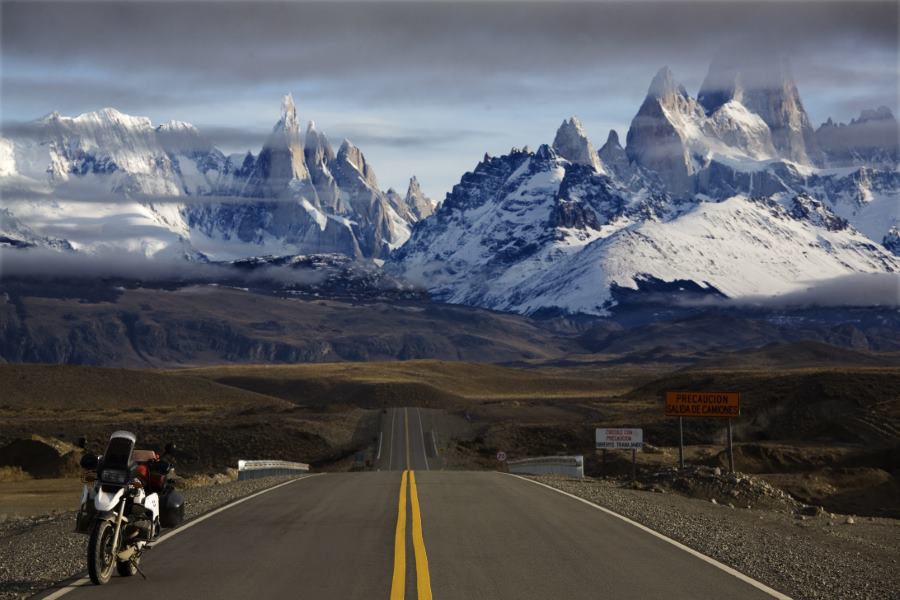
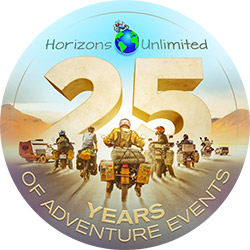
 42Likes
42Likes












 …cold.” Seems pretty rude sounding, really. If I learn the word for ‘now’, then I can make my staple phrase unmistakably rude, “hello…
…cold.” Seems pretty rude sounding, really. If I learn the word for ‘now’, then I can make my staple phrase unmistakably rude, “hello…

 Linear Mode
Linear Mode










